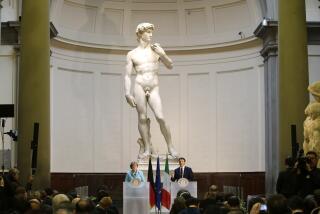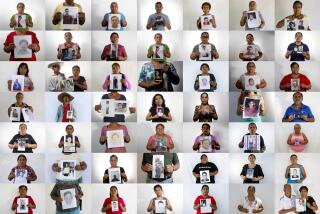Democrats may vote by race in S. Carolina
Shelby King is a fan of Barack Obama. She admires his charisma and passion and believes he could unite the country as president. On Saturday, however, King plans to vote for Hillary Rodham Clinton in South Carolina’s Democratic primary.
“She’s got the experience,” said King, 61, a real estate agent in Columbia, the state capital. “She’s tough. She’s bright. I’m a female of her era, and I know how hard it’s been to get to where she’s gotten.”
Edward Pair also likes Obama. But he plans to vote for John Edwards, who seems to have better ideas on how to fix the country. “It’s not just rhetoric,” said Pair, 57, a rural letter carrier. “Edwards has real good answers.”
South Carolina, host of the Democrats’ first Southern primary, is also the first contested state with a substantial black population. As many as half or more of those who turn out to vote Saturday may be African American, making Obama the favorite to win and boosting his efforts to become the nation’s first black president.
But that still leaves a substantial number of white voters -- King and Pair among them -- and their choices could mean the difference between a big Obama victory and something different. “Therein lies the key to what the margins are going to be,” said Carey Crantford, a veteran surveyor of South Carolina opinion.
Illinois Sen. Obama has plenty of white backers in the state, including former Gov. Jim Hodges and South Carolina’s two most recent Democratic chairmen. New York Sen. Clinton, whose husband is admired by many in the black community, has made inroads among African Americans here as elsewhere.
--
A racial divide
But a familiar pattern has emerged. It may not be driven by the racial animus that caused so many whites to flee the Democratic Party over the last few decades -- 96% of those casting ballots in last Saturday’s GOP primary in South Carolina were white. Still, polls have found a substantial divide between white and black in South Carolina, with Obama the favorite of African Americans, and Clinton and Edwards leading among whites.
King and Pair reflect two pillars of the Democratic Party in this heavily Republican state. One is women, especially the affluent and well-educated who live in cities. The other is hard-pressed rural voters who have stayed true to the party for the reason that Pair offered. “I’m a Democrat,” he said, “because I’m not rich.”
Obama’s challenge, especially beyond South Carolina, is to capture more of those core Democratic voters, particularly those living paycheck to paycheck, who powered Clinton to victories in New Hampshire and Nevada. “It’s hard to get excited about ‘change’ when you’re trying just to get by,” Crantford said of Obama’s political overhaul message.
Democrats are a minority in South Carolina. Although the state does not have party registration, experts say about one in three of those surveyed identify themselves as Democrats, compared to about four in 10 who call themselves Republican. The rest are nominal independents, who typically lean more Republican than Democratic.
Translated into political power, the GOP dominance is clear. Republicans hold most statewide offices, including the governorship and both U.S. Senate seats, plus four of the state’s six congressional seats and majorities in both houses of the Legislature. Democrats have not carried the state in a presidential race since 1976.
‘I’ve been a Democrat my whole life, and I’ve probably supported more losers than winners, quite frankly,” said John Long, 53, a white bank president in rural Cheraw. “I go to a party with my peers and I’m the only one who’s a Democrat.”
For some white Democrats, mainly in rural areas, their identity is a hand-me-down from the days of one-party rule and the solid Democratic South. For others teaching at universities, working in state government or living in cities and fashionable coastal communities, being a Democrat means pushing back against the prevailing political culture.
Two days of interviews, in Columbia and here in the state’s rural northeast, showed the hurdles facing Obama as he tries to broaden his coalition beyond African Americans to include more women and working-class voters.
--
Excitement but doubts
In Columbia’s mostly white Shandon neighborhood, where big maple trees shade rows of historic homes, there was excitement but doubts about the prospect of electing a black man or a woman as president.
Michelle Ehrlich, 55, was leaning toward Clinton, like virtually all of a dozen women interviewed. “I’m really anxious to have a woman president,” she said, though she plans to back Obama if he becomes the Democratic nominee.
“I feel the country is right at the precipice,” Ehrlich, an intensive-care nurse, said as her 5-month-old grandson Ian -- “a Democrat his whole life” -- gurgled from a carrier tucked in a shopping cart. “I think people want enough of a change that they will be willing to vote even when they normally would not for either a black or a female.”
Susan Boyd, who stopped by the Earth Fare grocery in her new black Prius, said she could see either Clinton or Obama as president, though she wondered about his “experience and depth of understanding of national politics and national management.”
“Raising the question of ‘can you vote for a woman, or can you vote for an African American’ really challenges us as a people,” said Boyd, 58, a healthcare consultant. “And hopefully we should be able to.”
Ninety minutes northeast of Columbia, in the rural reaches that hug the North Carolina border, white voters were decidedly more skeptical about Clinton, Obama and their chances of being elected president.
Few spoke openly of race or gender, though Jeff Williams allowed as how he did not feel a woman should run the country. “Just because of my Bible beliefs,” said the 43-year-old industrial mechanic, who backs Edwards because his union has endorsed the former North Carolina senator.
Several spoke of something indefinable that kept them from trusting Obama. “I don’t like his name,” said Charlene Lowery, 48, a former manager at the Springs Global textile plant, which laid off more than 500 people in Lancaster and the surrounding area when it closed last year. “I guess I shouldn’t have said that. It just sounds foreign to me. It doesn’t sound like Edwards.”
Former Sen. Edwards, whose campaign narrative rests on his upbringing in a Carolina mill town, enjoyed an affinity with many of those interviewed, even if they planned to vote for someone else.
“He knows what hard times are, and he’s for the man on the lower step of the ladder,” said Barbara Atkinson, 73, as she paused between errands in Pageland, one town over from Lancaster on east Highway 9.
Even so, she planned to vote for Clinton based on trust and her experience and, not incidentally, the fact that back in 1997 Atkinson and former President Clinton corresponded when both were recovering from knee injuries. “To me, that’s a caring person,” said Atkinson, who initiated the contact with a get-well card.
As for Obama, “He’s a good man and all.” But, Atkinson went on, “a lot of people are going to vote for him because he’s black, and they’re not weighing out what experience he’s had or what he can do for the country. They just like the idea he’s black.”
Atkinson was like several white voters interviewed in the Olde English District -- so-called because of its settlers and Revolutionary War history -- who thought the country was more likely to elect a woman than an African American president.
“I think what they call the religious coalition would try to keep a black man out,” said Pair, the mail carrier who liked all three major Democrats, but Edwards in particular. “I think a woman would have a better chance.”
“Myself,” Pair added, “I’d vote for the best person.”
--
More to Read
Start your day right
Sign up for Essential California for news, features and recommendations from the L.A. Times and beyond in your inbox six days a week.
You may occasionally receive promotional content from the Los Angeles Times.







